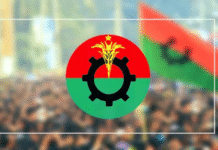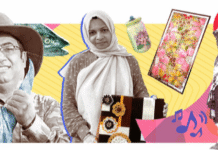Political calculations don’t tally
 It’s been a month or so now that the media has been rife with reports on Jubo League, Swechchashebok League and Chhatra League leaders. It was sparked off by a telephone conversation where leaders of the ruling party student front Bangladesh Chhatra League (BCL) demanded ‘commission’ from the Jahangirnagar University vice chancellor for development work on the campus.
It’s been a month or so now that the media has been rife with reports on Jubo League, Swechchashebok League and Chhatra League leaders. It was sparked off by a telephone conversation where leaders of the ruling party student front Bangladesh Chhatra League (BCL) demanded ‘commission’ from the Jahangirnagar University vice chancellor for development work on the campus.
After that came the revelation of millions of taka being minted by Jubo League and Swechchashebok League leaders from illegal casinos and tender scams. The transport business too transformed these leaders into overnight billionaires. These are facts that cannot be denied. But the question remains, if the leaders of these organisations, affiliated with the ruling party, have been amassing so much wealth by dubious means, what about the leaders of the main party? Surely they are no saints. Why are they not under scrutiny?
Among those detained so far, some are elected people’s representatives and many aspire to contest in the elections in the days to come. In fact, one of the main motives behind their lust for wealth is the election.
In a Prothom Alo report on 29 September, it was said that BNP had higher election expenditure than Awami League, and that Islami Andolan spent the most in the elections. The report, quoting election commission sources, said that according to the expenditure details submitted by the parties regarding the elections held in December last year, Awami League spent Tk 10,557,365 and BNP Tk 11,139,120 . Islami Oikya Andolan spent Tk 20,148,212. Workers Party spent Tk 11,400,000.
Even Workers Party, supposedly striving for the working masses, outdid Awami League and BNP in its expenditure. Somehow there were no questions about the unbelievable constraint practiced by the mainstream parties when it came to spending, not quite in keeping with the overall economic trends of the country.
The lavish manner in which the political leaders spend their money as individuals simply does not tally with the election expenditure records. A look back at past records is revealing.
The one-sided 2014 election hardly needs consideration as most of the opposition parties boycotted it. But the 2008 general election has relevance in this context. This election, held under the caretaker government, was a competitive one. In another Prothom Alo report of 8 August 2010 about BNP having spent the most in that election, it was said that BNP contested in 259 seats, spending Tk 44,950,000. Awami League contested in 263 seats and spent Tk 36,026,974.
These records show that this time BNP spent one-fourth of what it did previously in the election and Awami League one-third. Over the past 10 years, the cost of living has not decreased in any way. There has been no recession. Inflation has been at an average 5 per cent. If all the economic indicators are accurate, then there is no reason for election expenses not to increase. Under the circumstances, how did the mainstream political parties display such frugality?
Then again, if laws were imposed to restrict the extent and nature of campaigning, then expenditure would probably have fallen further. During the caretaker government, coloured posters and banners were banned. But there were no legal changes to campaigning in the 2018 polls. The last amendment of the Representation of the People Order was carried out in 2008, putting a Tk 45 million ceiling for each party’s election expenditure. This expenditure is fixed at Tk 30 million for more than 100 and less than 200 seats. So these parties have certainly controlled their expenditure much more than required according to the specified ceiling. The ruling party has surely created a work record in its prudent election spending.
The election commission is supposed to check this expenditure, but violating the rules has become a norm in the elections. According to the law, a candidate can be given a seven-year prison sentence for providing false information regarding election expenditure, but no one has been penalised so far.
There has been much criticism about the election commission’s incompetence in conducting the election, its biased partisan stance and other instances of unethical practice. But the criticism should end there. There is the matter of the political parties and their behaviour. Unless change is made there, such unbelievable instances will continue to emerge.
And now Rashed Khan Menon is in trouble. This leader’s Workers Party, a small ally of the ruling alliance, had recently questioned the credibility of the last general election. He had been a part of the power clique for 10 years, but his party workers at the field level had hardly benefitted in any way. Those who became members of parliament had flourished, gained in wealth and wellness.
The huge disparity in the country’s economy exists among the leaders and workers of Workers Party too. Disparity leads to dissatisfaction and this is sharply increasing before the party congress. Differences of opinion and anger are no longer restricted to within the party. It is obvious that he adopted this ploy to strengthen his position amidst the factional fracas.
There were hints that he would take up this stance when he questioned the credibility of the 30 December election in parliament. It smacks of opportunism that he now questions the very parliament which he joined under oath. On 19 October in Barishal, Mr Menon said that after the general election, people were also unable to vote in the upazila and union parishad elections. He said it was necessary to restore people’s confidence in the election system. He also spoke of the shrinking space for expressing difference of opinion. Many people criticise him for taking oath and remaining in parliament while castigating the election. The irate faction within his party is not free of such opportunism either. Their Marxist-Leninist ideology has long been in cold storage.
He may strengthen his position within the party through such rhetoric about the election, but perhaps he did not realise that this would not go down well with the mahajote (‘grand alliance’) and the government. But now back in Dhaka, he is faltering and churning out one shaky explanation after another. It’s a lot like the BBC comedy ‘Yeah But No But’. But now that the 14 party alliance has asked him for an explanation, he must be realising the harshness of this clamp-down on freedom of expression.
It is time for the politicians to stop using the media as a scapegoat when they fall into dire straits. With the prevalence of Smartphones and mobile journalism, misquoting can be suicidal.
*Kamal Ahmed is a senior journalist and columnist. This piece appeared in the print edition of Prothom Alo and has been rewritten in English by Ayesha Kabir









